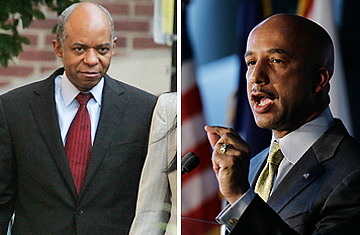
Representative William Jefferson and New Orleans Mayor Ray Nagin
The indictment of Rep. William Jefferson early this month surprised no one, not even the voters who elected him to a ninth consecutive term in Congress last year. But what caught many off guard was the breadth of the government's charges against the New Orleans Democrat, which now has everyone guessing who will emerge if the state's most influential African-American politician goes down. Many are putting their money on New Orleans Mayor Ray Nagin.
In Louisiana, black voters make up as much as 30% of the electorate, and they've been instrumental in helping Democrats win statewide races in the conservative Deep South. Working with churches and community organizations, African-American leaders like Jefferson have built clout by mobilizing black voters, who overwhelmingly vote for Democrats. And Democrats will need all the help they can get to hold on to the governor's office later this year, as well as the Senate seat held by Mary Landrieu. Landrieu, who will run for a third term in 2008, is considered one of the party's most vulnerable candidates, and a strong turnout by black voters will be crucial for her reelection — and for the Democrats' hope of taking Louisiana in the Presidential race.
Jefferson's legal troubles — and possible ouster from Congress — have opened a window for another controversial would-be power broker. Despite Nagin's sagging popularity, the colorful New Orleans mayor came back from the brink of political extinction by solidly winning a second term last November. He's something of a political chameleon, easygoing and businesslike when he needs to impress his conservative constituents and, since Hurricane Katrina, capable of a fiery, defiant oratory that has endeared him to a lot of African-Americans who are still struggling to get their lives back together — and who blame much of their difficulties on the state and federal governments.
"The person who has to be dealt with, first and foremost, is Ray Nagin," says Louisiana political analyst and demographer Elliott Stonecipher. "He has clearly demonstrated that he sees himself now as having a place on the national stage in African-American politics."
Yet the mayor has been uncharacteristically cagey about his intentions. Barred from running for a third term, and in possession of at least $500,000 in campaign funds, Nagin is said to have his eye on the 2008 gubernatorial race. Few people think he could actually win, but the real possibility of making it into a runoff against the G.O.P. fron-trunner, U.S. Rep. Bobby Jindal, would cement his status as the top dog among black Louisiana politicians and add to his stature with the national party.
Then there's the Second District congressional seat now held, however tenuously, by Jefferson. Here, Nagin's chances of victory are far better, should a conviction or resignation leave the seat open in 2008. But Nagin would likely face some serious competition, from candidates who ran against Jefferson last time around or from other New Orleans area lawmakers sensing a rare opportunity to grab an open seat — one whom could be Jalila Jefferson, one of the congressman's five daughters and a member of the state legislature.
For Jefferson's supporters, her election would be a measure of vindication for what many believe is a frame-up. His indictment includes 16 counts alleging fraud, racketeering, money laundering, soliciting bribes and violating the Foreign Corrupt Practices Act, charges that could land him a prison term of more than 200 years. All along, "Dollar Bill" — a nickname he was tagged with early in his political career — has maintained his innocence. At his arraignment, where he entered a not guilty plea, he offered a hint to what could be a central part his defense — that the charges are politically motivated — and suggested that the "honorable explanation" he promised during the last campaign will be revealed.
"I'm sure the pressure is on for him to resign, but I don't think you'll see it," says political analyst Bernie Pinsonat. "That's just not his nature." There's the chance that Jefferson will be acquitted at a trial. "And if he isn't convicted, he will be reelected," Pinsonat says.
Either way, Jefferson's fate has become something bigger than the man himself. He rose from a dirt-poor rural childhood to attend Harvard law school and became, in 1990, the first African-American elected to Congress from Louisiana since Reconstruction; his equally spectacular fall, if it comes, would be a bitter disappointment to many constituents. Some of them have already organized in his defense; a group calling itself the Justice for Jefferson Committee issued a statement less than a week after the indictment accusing the federal government of using "vast financial resources to manipulate the media" and calling the Justice Department's pursuit of the congressman a betrayal of voters' rights.
The national Democratic Party, which would doubtless love to be rid of the matter before the 2008 election, also is watching with great interest what happens in Jefferson's district. "I think the reason that this is disproportionately important is that until now, in political circles, the Second Congressional District office was a New Orleans office," says Stonecipher. "Now, it's about the restoration, the maintenance, the promotion of African-American political interests in Louisiana."
